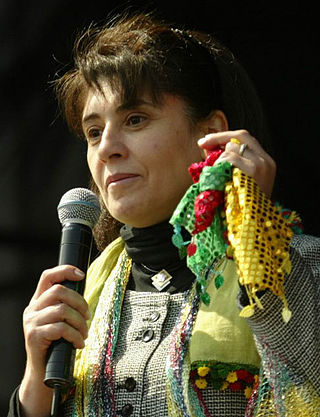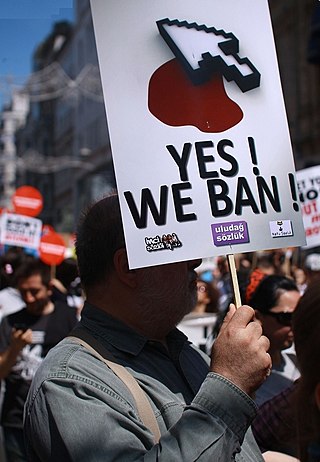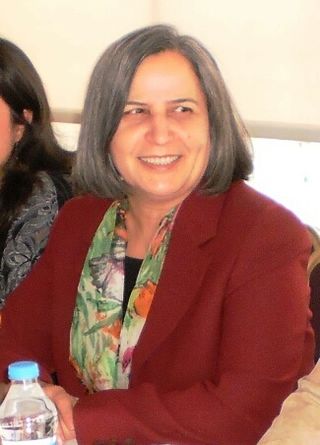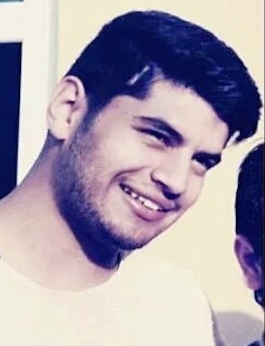Related Research Articles

Human rights in Turkey are protected by a variety of international law treaties, which take precedence over domestic legislation, according to Article 90 of the 1982 Constitution. The International Covenant on Civil and Political Rights (ICCPR) was not signed by Turkey until 2000. As of today, however, Turkey is party to 16 out of 18 international human rights treaties of the United Nations. The issue of human rights is of high importance for the negotiations with the European Union (EU).

Leyla Zana is a Kurdish politician. She was imprisoned for ten years for her political activism, which was deemed by the Turkish courts to be against the unity of the country. She was awarded the 1995 Sakharov Prize by the European Parliament but was unable to collect it until her release in 2004. She was also awarded the Rafto Prize in 1994 after being recognized by the Rafto Foundation for being incarcerated for her peaceful struggle for the human rights of the Kurdish people in Turkey and the neighbouring countries.

Zaman, sometimes stylized as ZAMAN, was a daily newspaper in Turkey. Zaman was a major, high-circulation daily before government seizure on 4 March 2016. It was founded in 1986 and was the first Turkish daily to go online in 1995. It contained national (Turkish), international, business, and other news. It also had many regular columnists covering current affairs, interviews, and a culture section. The newspaper is known for its closeness to Fethullah Gülen, the leader of the Gülen movement. The newspaper originally supported the Justice and Development Party (AKP), but became increasingly critical of that party and its leader, Turkish president and former prime minister Recep Tayyip Erdoğan, particularly after the AKP closed the 2013 December investigation into corruption. On 4 March 2016, in what activists and international media groups criticized as another blow to press freedom in Turkey, control of the newspaper was seized by the government. The takeover was motivated by the newspaper's ties to the Hizmet movement of Turkish cleric Fethullah Gülen, which the government accuses of attempting to establish a parallel state in Turkey.
Kurds have had a long history of discrimination perpetrated against them by the Turkish government. Massacres have periodically occurred against the Kurds since the establishment of the Republic of Turkey in 1923. Among the most significant is the massacre that happened during the Dersim rebellion, when 13,160 civilians were killed by the Turkish Army and 11,818 people were sent into exile. According to McDowall, 40,000 people were killed. The Zilan massacre of 1930 was a massacre of Kurdish residents of Turkey during the Ararat rebellion, in which 5,000 to 47,000 were killed.

Censorship in Turkey is regulated by domestic and international legislation, the latter taking precedence over domestic law, according to Article 90 of the Constitution of Turkey.
Musa Anter, also known as "Apê Musa", was a Kurdish writer, journalist and intellectual. Anter was assassinated by Turkish JITEM in September 1992.

Rojda Aykoç, also known as Rojda Şenses or simply Rojda, is a contemporary Kurdish singer.

Gültan Kışanak is a Kurdish journalist, author and politician from Turkey. Kışanak was born in Elazığ in 1961. Her family is originally from Dersim. She is a former member of the Grand National Assembly of Turkey and Mayor of Diyarbakır. She has been imprisoned since October 2016.
Azad Zal is a poet, writer, journalist, translator and linguist of Kurdish origin. He was born in 1972 in Sur district (Diyarbakır). He is the vice chairman of the Kurdish Writers' Association and he is section editor of the Kurdish Institute in Diyarbakır.

Diyarbakır Prison is a prison located in Diyarbakır, southeastern Turkey. It was established in 1980 as an E-type prison by the Ministry of Justice. After the September 12, 1980 Turkish coup d'état, the facility was transferred to military administration and became a Martial Law Military Prison. Control of the prison was returned to the Ministry of Justice on May 8, 1988.
The 2011–2012 Kurdish protests in Turkey were protests in Turkey, led by the Peace and Democracy Party (BDP), against restrictions of Kurdish rights by of the country's Kurdish minority's rights. Although they were the latest in a long series of protest actions by Kurds in Turkey, they were strongly influenced by the concurrent popular protests throughout the Middle East and North Africa, and the Turkish publication Hürriyet Daily News has suggested that the popularly dubbed "Arab Spring" that has seen revolutions in Egypt and Tunisia may lead to a "Kurdish Summer" in the northern reaches of the Middle East. Protesters have taken to the streets both in Istanbul and in southeast Turkey, with some demonstrations also reported as far west in Anatolia as İzmir.

Mehmet Hatip Dicle, is a Kurdish politician from Turkey. He was a member of the Democracy Party, then of the Peace and Democracy Party (BDP).
Özgür Gündem was an Istanbul-based daily Turkish language newspaper, mainly read by Kurds. Launched in May 1992, the newspaper was known for its extensive reporting on the Kurdish-Turkish conflict, and was regularly accused of making propaganda for the Kurdistan Workers' Party (PKK). Its editors and staff have frequently been arrested and prosecuted, which resulted in multiple publication bans. Since April 1994, the publication continued under different names until Özgür Gündem was relaunched in 2011.
Hatice Duman is a Kurdish journalist and editor-in-chief of the daily Atılım, the official newspaper of the Marxist–Leninist Communist Party (MLKP) in Turkey. Since April 9, 2003, she has been in prison, accused of being a manager of a terrorist organisation. On October 16, 2012, Turkey's Supreme Court of Appeals confirmed the sentence of life-time imprisonment against her.

Rohat Aktaş a Turkish-Kurdish journalist and news editor for Azadiya Welat in the southeastern Turkish town Cizre, Şırnak Province, Turkey, was shot on January 22, disappeared on January 30, 2016, and discovered later dead. At the time, he was reporting about the armed confrontation between Kurdish separatists and Turkish forces, which is part of the Kurdish–Turkish conflict (1978–present).
Ziya Pir is a Turkish and German entrepreneur and politician of the Peoples' Democratic Party (HDP).
Kadri Gürsel is a Turkish journalist. He became prominent when the Turkish government imprisoned him for his coverage on groups associated with terrorism. On October 31, 2016, while working for the newspaper Cumhuriyet, Kadri Gürsel was taken into custody together with many of his colleagues. The journalists were arrested for alleged ties to terrorist organizations, including the Kurdistan Workers' Party (PKK), the Revolutionary People's Liberation Party-Front (DHKP-C), and the Fethullahist Terrorist Organization (FETÖ).
Doğan Güzel is a Kurdish Turkish-born cartoonist. He is best known for his satirical comic strip Qirix.
Ayşe Gökkan is a Kurdish journalist, feminist, spokeswoman of the Free Women Movement (TJA) and a former Mayor of Nusaybin. As a journalist, she has been active in news outlets such as Özgür Gündem or Azadiya Welat. Gökkan was sentenced to 30 years imprisonment on grounds that she was a leader and a member of a terror organization in October 2021.
References
- ↑ "Türkische Polizei stürmt kurdische Zeitung" [Turkish police raids Kurdish newspaper]. Der Standard (in German). 28 August 2016. Retrieved 29 August 2016.
- 1 2 3 4 "Non-Turkish language newspapers and minority press". European Stability Initiative. Retrieved 18 June 2015.
- ↑ "Editor-in-chief of Turkish daily Azadiya Welat sentenced to three years in prison". WAN-IFRA. Retrieved 14 October 2014.
- ↑ ""Azadiya Welat Dağıtımcısı Kadri Bağdu Öldürüldü" ("Kadri Bağdu, Journal distributed for Azadiya Welat, Killed")". Bianet. Retrieved 14 October 2014.
- 1 2 Mesut Yurtsever et al vs Turkey, 20 January 2015.
- ↑ Law No. 5275 on the execution of penalties and security measures Archived July 22, 2014, at the Wayback Machine , 13 December 2004.